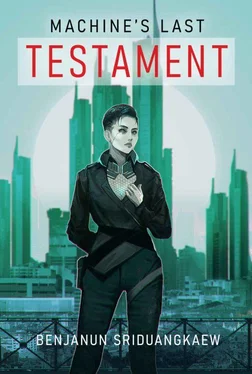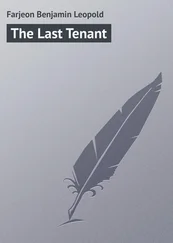On her way back to Suzhen’s home, she stops at a street market and tries to purchase fruits. This is denied—her account, it appears, has been locked against any transaction at all. The proprietor already has an eyebrow raised to see her use a portable rather than datasphere, and when she is unable to pay he asks if he should call the Bureau or Interior Defense. Odd to offer her a choice at all, but maybe he thinks it is the kindest he can be. She gives him a little bow before apologizing and leaving his stall. His eyes follow her, as do those of his employees and his customers. She has experienced much worse humiliation since her arrival here, but she can imagine this being the one that undoes a person, the last straw on dignity’s brittle back.
The day grows warm. She takes shelter near a tearoom: observes for a time the motion of clinking cups and saucers, the sedate progress of tiered stands from kitchen to table. Every plate is piled high with small cakes dusted with coffee and raisins, multi-colored discs made from sugar and albumen, cups of puddings and mousse. Waiters wear corsets of exoskeleton and mirror shards, wide hooped skirts done in organza and scrimshaw. The place appears to be reproducing the style of a long-lost civilization—not any one aspect or era, but the entirety at once. The tearoom is built with a high ceiling, vaulted and painted with murals of white-robed beings with dove wings, and the street-facing windows are partly stained. Bright primary colors, images of apples and naked women wrapped in coiling snakes. Peculiar iconography spills out the door, froths of steel and copper lace and crucifixes nestling between them, the sort some people from Wyomere wear.
Someone steps behind Ovuha. Remains there, not moving on.
Once she would have availed herself of personal sensors that would have given her an image of this person from every relevant angle, collected every necessary point of data in an instant. How tall they are, how heavy, what signals they emit if any, whether they wear combat augments. An olfactory analysis to guess whether they smoke or partake of drugs—to enhance physique and block pain, to alter pheromones—and make that judgment with a margin of error so small it is expressed as a vanishing decimal point. She would not need to look at them with flesh eyes to assess threat. The world was at her fingertips, the orbits of stars hers to shift and rearrange.
This person is not the thug that accosted her on the Jasmine’s rooftop. They are rounder and paler, without much in way of tattoos—just a smattering of animated dermals on their forearms, a school of ribbon-fish. “Ovuha Sui, I believe,” they say, raising their eyes to meet hers. They have to crane their neck, being small: a hundred sixty to Ovuha’s hundred ninety-eight. “I don’t believe you have found employment. You must worry your caseworker to death.”
“I’m sure I do. It is not an ideal state. I don’t believe we’ve met?”
“I represent the interest of someone who wishes to see every potentiate pursuing gainful paths.”
“Yes,” Ovuha says slowly, “I have heard of those paths. I’m afraid my body is not for sale.”
The person dimples. Their ribbon-fish thrash, as though stranded on dry land. “It is nothing like that, friend. There is demand for… therapy where the client’s body is the one that receives treatment. Do you understand?”
She does not ask why such clients want potentiates in particular for this. People have a hundred thousand varied urges. “An unusual proposition. What happens if I damage the client, which seems inevitable and rather part of the idea? Won’t Interior Defense instantly materialize and shoot me in the head?”
“Assuredly not. As you say, inflicting hurt in controlled ways is the point. Anything done during the session is exempt from assault or battery clauses, as long as it falls under the terms you and the client have negotiated, and does not cause injury above a certain grade.”
“And,” Ovuha says, “why me?”
“It is a specific need. The client requested a person of, ah yes, brutal beauty and masterly disposition. Such criteria are difficult to fulfill when one’s talent pool comprises of potentiates. They tend to be a little too beaten down for the role.”
“Brutal beauty,” she repeats, dry.
The intermediary beams again. A cluster of ribbon-fish spill down their elbow, scrambling for purchase. “If I didn’t know better, I’d say your face came out of a catalogue. Which it might well be, no shame in that, though the surgery must’ve drained the coffers of a wasteland world or two. Best to make use of it, don’t you think? But you know that already.”
Perhaps it is idle speculation. Perhaps it is precisely said, these taunts. The person who sent her the neurotoxin map—the Anatta contact with whom her predecessor sealed a covenant—almost certainly sent this intermediary. The Jasmine arson might well have been arranged to mask the act of reaching out to Ovuha. “I’m in no place to choose,” she says.
“Thank you—I’ll get a handsome commission from it. You’ll know the client when they approach you, I’ll seed your portable with an alert.” They give her a little wave. “Perform well, Ovuha Sui. Keep it up and we’ll both grow richer from it.”
Suzhen comes home to Ovuha in the kitchen sculpting fruits and vegetables. A melon swan, preening, its body hollowed to hold strawberries and gandarias carved into tiny roses. “I tried to buy groceries,” she is saying when Suzhen enters, “but I discovered that I can’t make any transaction without your authorization; evidently I’m legally considered your dependent the same way a child is.”
“I forgot about that.” Suzhen watches the glint of chisel in Ovuha’s hand, small and sharp, fast-moving. Hypnotic. The domestic drone must have done some of the work, but even so this is impressive. “Is there anything you need? Spices, condiments I don’t have? I’ll order it in.”
“No, I just wanted to do my part.” Ovuha flicks a sliver of fruit into a waiting bowl; the entire kitchen is absurdly pristine given the work. Cutting boards lightly wet, a tray of soup dumplings—the skin in black, green, red—prepared for the steamer. Honeyed pork, glistening and succulent, awaiting the knife. “How was your day?”
“I went to a funeral. We used to be colleagues.”
“My condolences.”
“We weren’t close. He trained me at the Bureau, and he was mindful enough.” Not empathetic but not cruel. Indifference is the best one can hope for in a selection agent. “Last week, he chose to pass on. His wife and husband were devastated. As far as they knew, he wasn’t troubled by anything.”
“Occasionally people want to stop. That should be respected.” Ovuha continues whittling the piece of carrot in her hand. A pagoda half-done, windows carved out, the roofs unformed. “Samsara’s grace could be too much, do you think? When one has total comfort and freedom in some matters, yet is utterly restricted in others, the glory of paradise may turn to dross. But I didn’t know him and I’m speculating, which hardly seems proper, and I’m being too idle.”
“As for that, about the job.” Suzhen finds herself brusquer than she meant to be—the subject has gotten too personal. “My friend is Taheen Sahl. They’re a couturier; a lot of my clothes were presents from them, though they complain I don’t wear them properly. They’re always on the lookout for models.”
“Are there not mannequins for that?”
“Taheen prefers drones for assistants, people for models. Cleaner work and better inspiration, apparently.” Suzhen tries for circumspect, euphemistic. Decides that blunt is more efficient. “You’ll catch their eye—I know their preferences—and they’ll ask you to work with them. They may compliment your looks. But they won’t make advances that aren’t welcome. They won’t abuse their position, and if they do in the slightest, you will let me know.”
Читать дальше












